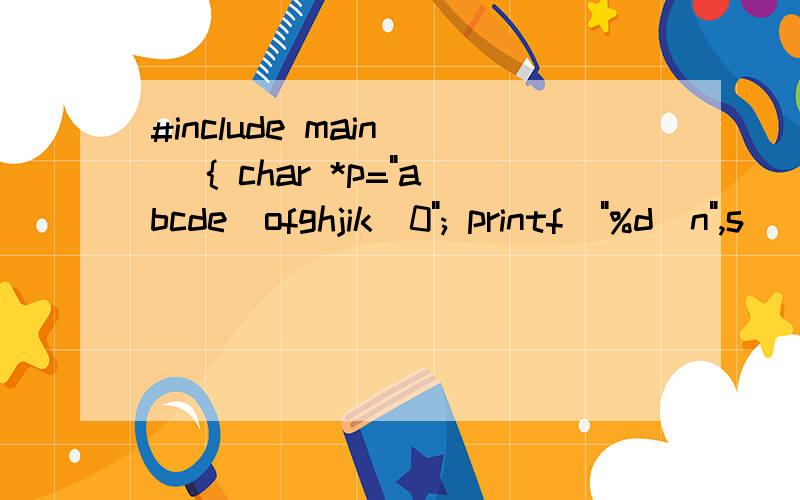#include main() { char *p="abcde\ofghjik\0"; printf("%d\n",s
来源:学生作业帮 编辑:神马作文网作业帮 分类:综合作业 时间:2024/11/10 17:27:32
#include main() { char *p="abcde\ofghjik\0"; printf("%d\n",strlen(p)); }
#include
main()
{ char *p="abcde\ofghjik\0";
printf("%d\n",strlen(p));
}程序运行后输出结果是
a12 b15 c6 d5
#include
main()
{ char *p="abcde\ofghjik\0";
printf("%d\n",strlen(p));
}程序运行后输出结果是
a12 b15 c6 d5

a 12
abcde\ofghjik\0
共有12个字符
a,b,c,d,e,\o,f,g,h,j,i,k(‘\o'转义字符,表示空字符(NULL)’)
最后的'\0'为结束符,不算做字符串长度之内
abcde\ofghjik\0
共有12个字符
a,b,c,d,e,\o,f,g,h,j,i,k(‘\o'转义字符,表示空字符(NULL)’)
最后的'\0'为结束符,不算做字符串长度之内
#include main() { char *p="abcde\ofghjik\0"; printf("%d\n",s
#include main() {char x=0xFFFF; printf("%d",x);}
main() { #include char *p="ABC"; printf("%d",strlen(p)+*p);
main() { char s[]="stop\0\n\""; printf("%d\n",strlen(s)) }
#include main() {char *s={"abc"}; do { printf("%d",*s%10); +
#include main() { unsigned char a=8,c; c=a>>3; printf("%d\n"
#include main() {char ch; ch='A'+'5'-'3'; printf("%d,%c\n",c
#include; char *p="ABC" printf("%d",strlen(p)+*p);
main(){ char *s,*s1="Here";s=s1;while(*s1)s1++;printf("%d\n"
#include void main() { char a1='M',a2='m'; printf("%c\n",(a1
main() {char c1='F',c2='P'; printf("%d,%d\n",c1,c2); } 解出来是多
详解下面的程序题.#include void main(){ char *p,*q;p=(char *)malloc(s